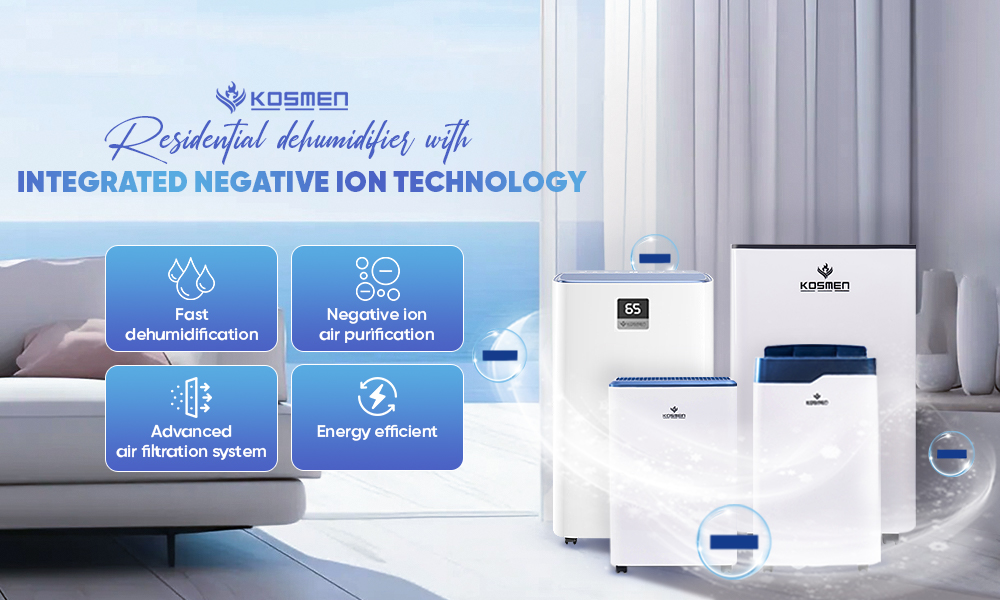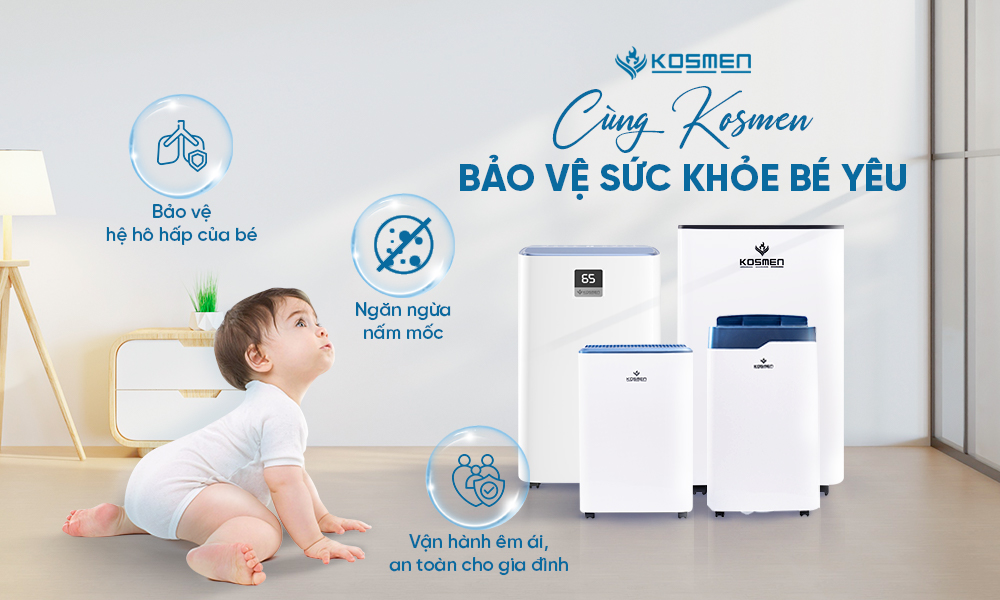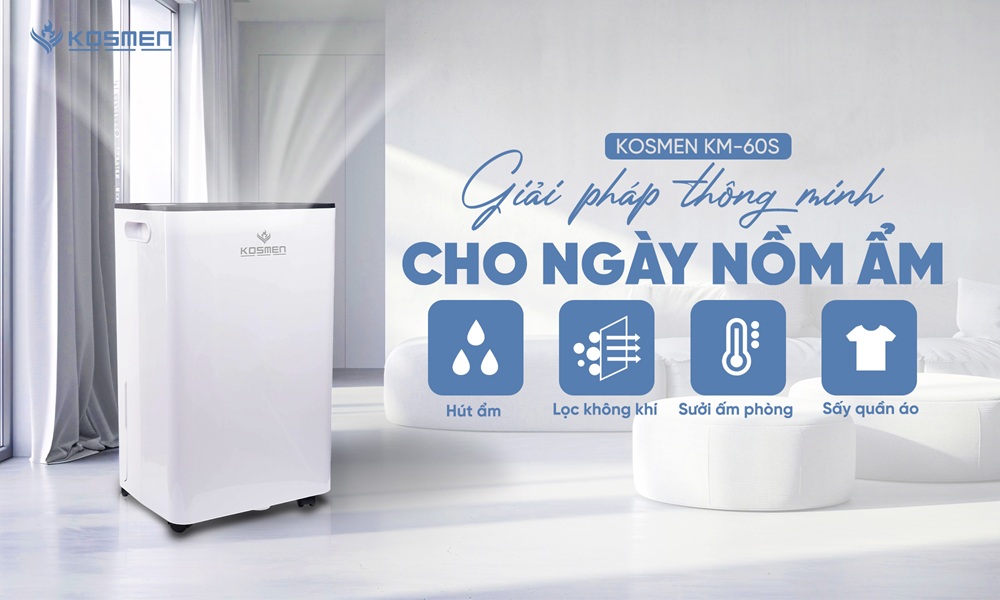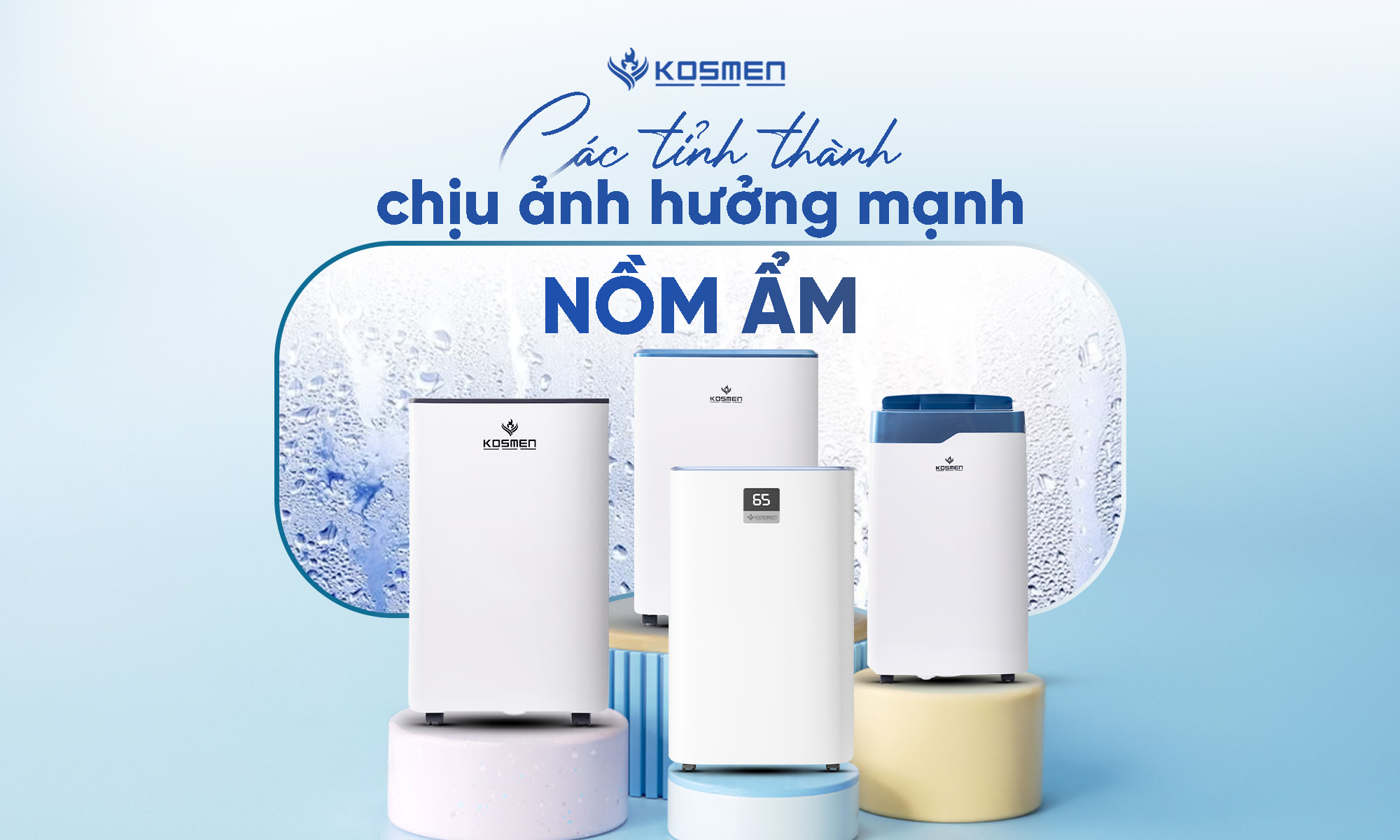Published: 12.02.2026
See moreOptimal Humidity for a Newborn's Room: What's Best?
 Published:
17/03/2025, 10:37
- Updated at 25/06/2025, 14:26
Published:
17/03/2025, 10:37
- Updated at 25/06/2025, 14:26Maintaining the proper room humidity for newborns plays a crucial role in protecting their health and ensuring comprehensive development. So, what is the ideal humidity level for a baby's room? Kosmen will share essential information about the ideal humidity in a newborn's space to help prevent respiratory and skin issues. If you're looking for insights on this topic, join Kosmen in exploring the details in the article below.
What is the Ideal Humidity Level for a Newborn's Room?
The humidity level in a newborn's room plays a vital role in ensuring healthy development and preventing health issues. The ideal humidity for a baby's room typically ranges from 40% to 60%.
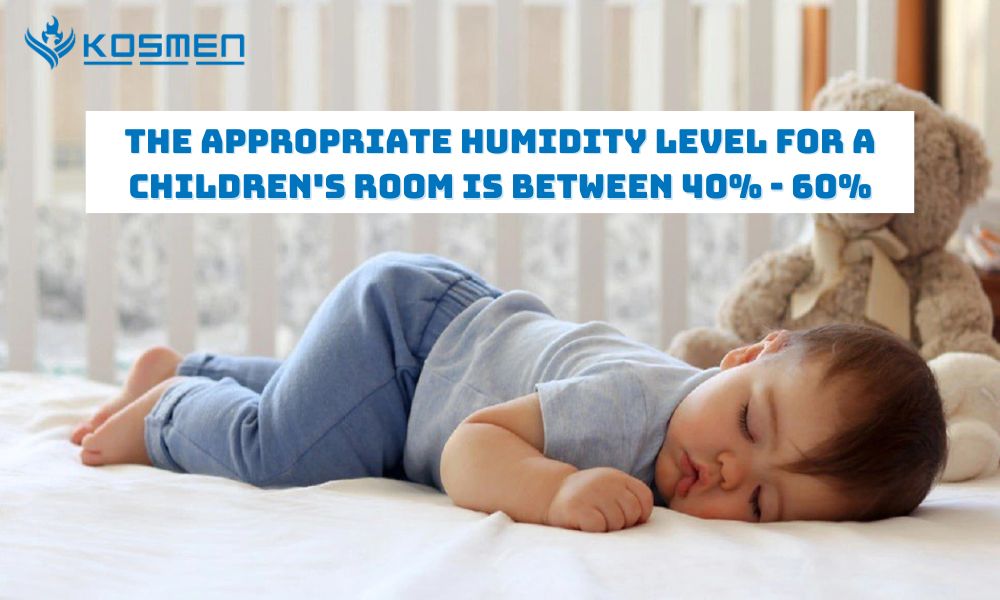 The appropriate humidity level for a children's room is between 40% - 60%
The appropriate humidity level for a children's room is between 40% - 60%
This humidity level is not too high to cause stuffiness or create an environment for bacteria and mold growth, nor too low to dry out the skin, cause nasal congestion, or lead to respiratory issues.
When humidity is too low, babies may experience dry noses, difficulty breathing, and cracked skin. On the other hand, excessive humidity can make the nursery feel stuffy and uncomfortable, while encouraging mold growth.
Why is Maintaining Proper Humidity in a Newborn's Room Important?
Maintaining the right humidity level plays a crucial role in a baby's development. Here are the benefits of proper humidity control:
Protects the Respiratory System
An ideal humidity level helps keep the baby's nasal passages and airways comfortable, preventing dryness and breathing difficulties. Additionally, the right humidity reduces fine dust in the air, making it easier for the baby to breathe.
Improves Sleep Quality
When the air is properly humidified, babies feel more comfortable and relaxed, allowing them to fall into a deep sleep. This helps ensure uninterrupted rest, which is essential for the baby's overall development.
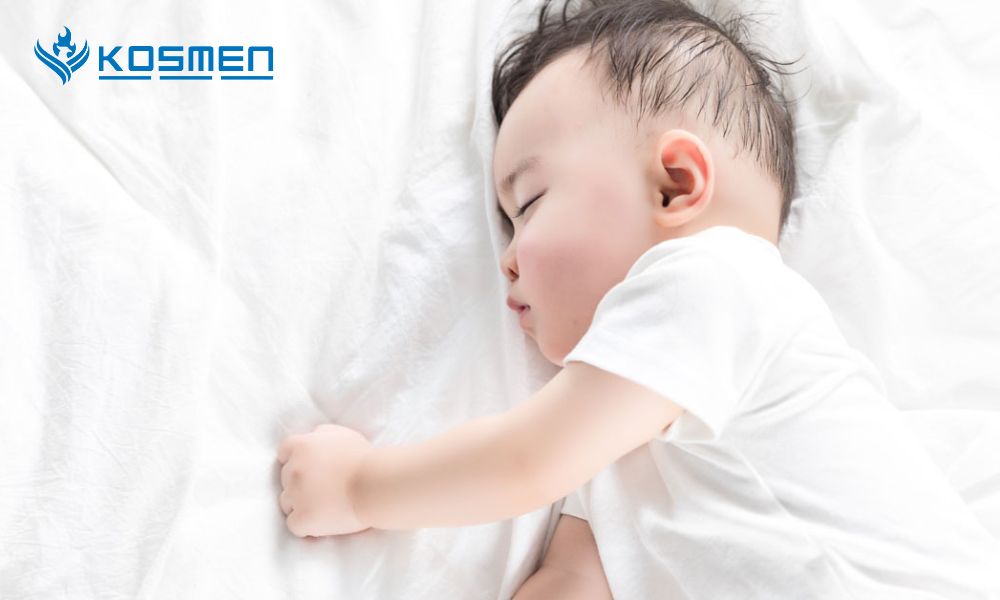 Improves sleep quality
Improves sleep quality
Protects the Baby's Sensitive Skin
Maintaining stable humidity in the baby's room keeps their skin soft and prevents dryness or peeling. With sufficient moisture in the air, the baby's skin retains its natural hydration, reducing the risk of skin conditions such as eczema, heat rash, or diaper rash.
Signs Your Baby is Affected by Improper Humidity
Symptoms of High Humidity
When the humidity in the baby's room is too high, the baby may experience nasal congestion, coughing, and difficulty breathing due to the damp environment that promotes the growth of bacteria and mold. The baby might feel hot and sweat excessively, even when the weather is not particularly warm, leading to discomfort and disrupted sleep.
Prolonged exposure to high humidity can also cause mold to grow on walls, clothes, and toys, increasing the risk of infections and skin conditions.
Symptoms of Low Humidity
Conversely, if the humidity is too low, the baby's sensitive skin may become dry, flaky, or cracked. Dry air can also affect the respiratory system, causing dryness in the nose and throat, which can lead to conditions like sore throat or sinusitis.
If the lack of humidity persists, the baby may feel uncomfortable, cry more frequently, and have disrupted sleep due to the dryness and difficulty breathing.
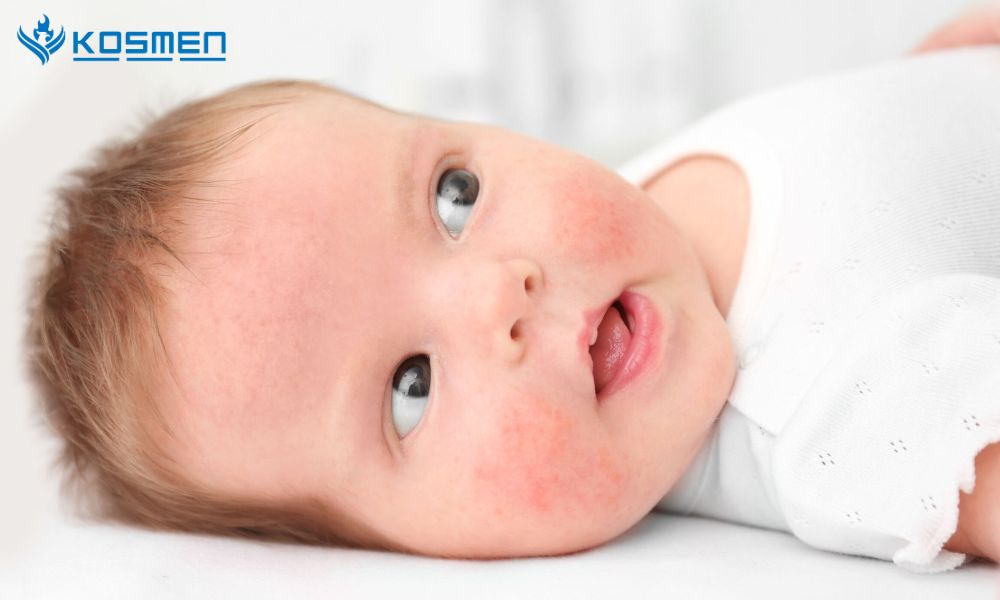 A baby's skin becomes dry when the humidity is low
A baby's skin becomes dry when the humidity is low
How to Adjust Humidity in a Baby's Room When It’s Too Low
When the humidity in a newborn's room is too low, the air becomes dry, which can lead to dry skin, breathing difficulties, and nasal issues like congestion. To improve this situation, Kosmen suggests a few simple yet effective methods:
Place a Bowl of Water or a Wet Towel in the Room
An easy and effective way to increase humidity is to place a bowl of water or a wet towel in the baby’s room. As the water evaporates, moisture is naturally added to the air without the need for electronic devices. This method is simple, cost-effective, and safe for daily use without affecting the baby’s health.
Add Green Plants to the Room
Green plants not only enhance the aesthetics of your space but also help maintain humidity. Plants such as snake plants, ivy, or palms can increase moisture levels and make the air fresher and more comfortable. During photosynthesis, plants release water vapor, which helps naturally regulate humidity in the room.
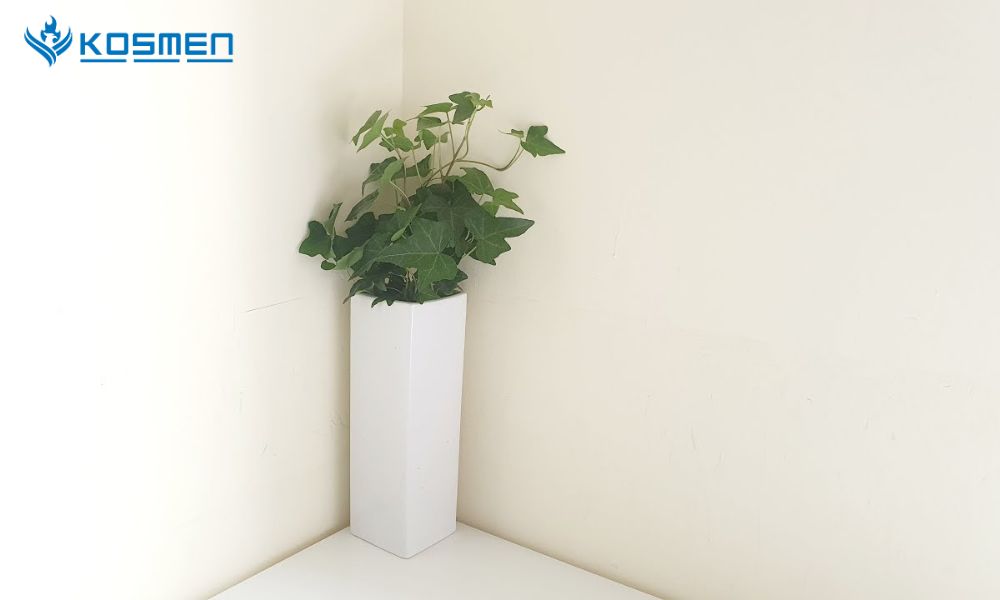 Placing ivy plants indoors helps maintain humidity
Placing ivy plants indoors helps maintain humidity
Using a Spray Bottle
Using a spray bottle to mist water into the air is a quick and effective way to increase humidity. Simply spray lightly around the room, especially near the baby’s crib, to maintain stable humidity levels. However, be careful not to spray too much water, as excessive moisture can cause discomfort.
How to Adjust Humidity in a Baby's Room When It’s Too High
Excessive humidity can create a stuffy environment and promote the growth of mold and bacteria. To control humidity when it's too high, try these methods:
Use Quicklime or Rock Salt
Quicklime and rock salt have excellent moisture-absorbing properties. Placing a few pieces of quicklime or rock salt in the corners of the room can help keep the air dry. However, ensure these materials are kept out of the baby’s reach to avoid accidents.
Use Activated Charcoal or Dehumidifying Bags
Activated charcoal and dehumidifying bags are highly effective in absorbing moisture. Activated charcoal not only reduces humidity but also eliminates odors, making the air fresher. You can place a small amount of charcoal or moisture-absorbing bags in corners or near the baby’s crib to improve the room's condition.
 Using activated charcoal helps reduce humidity
Using activated charcoal helps reduce humidity
Avoid Drying Clothes in the Room
Drying clothes indoors releases moisture into the air, raising humidity levels. To prevent this, dry clothes in a different area or on sunny days to speed up drying and avoid increasing humidity in the baby's room.
Use a Dehumidifier
Using a dehumidifier is an effective solution to control humidity in the house, especially in some northern areas affected by damp weather. A dehumidifier is a specialized device that helps reduce humidity quickly and efficiently. If the room’s humidity is too high, using a dehumidifier is a convenient and accurate solution to maintain and balance the humidity within a safe range.
A dehumidifier helps keep the air dry, creating a comfortable environment for children and reducing the risk of mold growth. You can refer to some Kosmen dehumidifiers from the German brand, which are trusted by many families and come with a variety of smart features.
- Kosmen KM-12N, with a dehumidification capacity of 12 liters per day, is ideal for small spaces like bedrooms and living rooms up to 40m². It features antibacterial functions, air filtration with negative ion technology, WiFi connectivity, and remote control via an app.
- Kosmen KM-20N operates at 20 liters per day and is suitable for spaces between 40m² and 80m². It comes with a digital control panel, LED touch screen, child lock, clothes-drying mode, timer, and memory settings.
- Kosmen KM-30N, with a capacity of 30 liters per day, is perfect for larger spaces from 70m² to 105m². It includes a HEPA H13 filter, activated carbon filter, and a durable Panasonic compressor with negative ion technology to eliminate bacteria and odors.
- Kosmen KM-60S can remove up to 60 liters of moisture per day, making it ideal for areas from 50m² to 110m². It features a large water tank with a full-tank alert, clothes-drying mode, timer, and adjustable humidity settings for maximum convenience and efficiency.
 Kosmen residential dehumidifier, German brand
Kosmen residential dehumidifier, German brand
Some Tips for Adjusting the Humidity in a Newborn's Room
When to Open or Close the Door
Whether to open or close the door depends on the external weather conditions. In winter, the air outside is usually cold and dry, so closing the door can help retain humidity inside the room. On the other hand, in summer, when the outdoor air is more humid, opening the door allows for better airflow, reduces indoor humidity, and makes the room cooler.
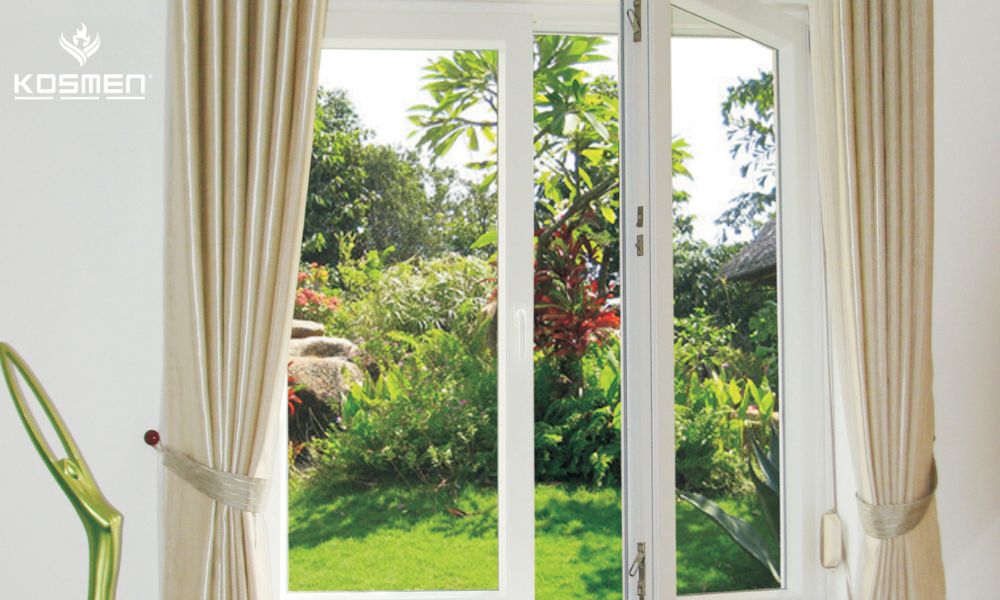 Opening the door helps air circulation
Opening the door helps air circulation
Regularly Check Humidity with a Hygrometer
To ensure the humidity level in the room stays safe, you should check it regularly with a hygrometer. This allows you to monitor and make timely adjustments if the humidity is too high or too low.
Maintain Stable Humidity, Avoid Sudden Changes
Sudden changes in humidity can affect your baby’s health, particularly the respiratory system. Therefore, it’s essential to maintain stable humidity. You should adjust the humidity gradually and avoid letting it fluctuate too quickly, which could create instability in the baby’s environment.
Keep the Room Clean and Fresh
In addition to adjusting humidity, it’s important to keep the room clean and airy. Regularly cleaning the room helps remove dust and bacteria and prevents musty odors. A fresh and clean environment provides the baby with a safe and comfortable space for healthy development.
Here is a summary of information that can answer your questions about the ideal humidity for a newborn's room, how much humidity is suitable, why it's important to maintain the right humidity, and appropriate solutions.
We hope that with the content from Kosmen, you can learn how to care for and protect your beloved child in the best way possible. If you're interested in dehumidifier products, feel free to contact Kosmen to receive the best offers!
KOSMEN BRAND – MANUFACTURED TO GERMAN TECHNOLOGY STANDARDS
- Head Office: 27B Street 12, KP2, Hiep Binh Phuoc Ward, Thu Duc City, Ho Chi Minh City
- Hanoi Office: NV 4.7 Hai Au 2 Street, Cau Buou Urban Area, Thanh Trì District, Hanoi
- Da Nang Office: 385B Hai Phong Street, Tan Chinh Ward, Thanh Khe District, Da Nang City
- Da Lat Office: 38/7 Ba Thang Hai Alley, Ward 4, Da Lat City
- Hotline: North: 0766 899 799, South: 0888 787 959, Central Highlands: 0961 061 076
- Website: kosmen.com.vn













